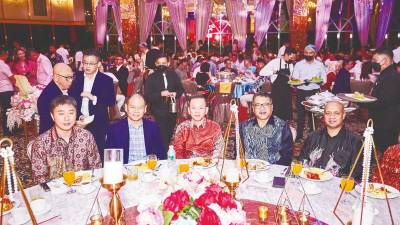KUALA LUMPUR: Malaysia’s timber exports continue to show resilience, achieving a total value of RM9.03 billion from January to May this year despite headwinds such as the United States’ imposition of tariffs, a slowdown in the global economy and other external challenges.
Plantation and Commodities Deputy Minister Datuk Chan Foong Hin said the main export products during this period were wooden furniture worth RM3.9 billion, plywood RM933.8 million, sawn timber RM797.8 million, builders’ joinery and carpentry RM560.5 million, and mouldings RM382 million.
“Nevertheless, the industry continues to strive for better results despite the challenges faced, to maintain the competitiveness of Malaysia’s timber exports,” he said at a Timber Exporters’ Association of Malaysia (TEAM) anniversary event recently that drew over 400 attendees, including representatives from government agencies, industry councils, international buyers and trade partners.
Chan acknowledged the industry’s concerns over the European Union Deforestation Regulation (EUDR), which demands a high level of supply chain transparency and verification.
In response, he said that the ministry is working closely with relevant agencies to ensure full compliance throughout the entire timber value chain, with a strong focus on traceability, transparency and legality.
The ministry has also been engaging with industry stakeholders, including TEAM, on other developments such as the proposed listing of the Shorea species under Appendix II of the Convention on International Trade in Endangered Species or CITES.
“While this listing poses compliance and operational challenges, it also presents an opportunity for Malaysia to reinforce its position as a leader in sustainable and verified timber production,” Chan said.
He noted that the global timber trade has become increasingly competitive, with neighbouring countries such as Indonesia and Vietnam recording strong growth over the past two decades.
“Nevertheless, Malaysia continues to maintain its edge through adherence to legal frameworks, professionalism and a long-standing reputation for quality values that TEAM has consistently upheld,” he added.
Chan also addressed domestic concerns over the expanded Sales and Service Tax (SST) and US trade tariffs, which have raised costs and eroded competitiveness. The SST, he said, has increased operational expenses by 8–12%, which has pushed up prices across the supply chain and particularly affected small and medium enterprises.
“Although export products aren’t directly taxed, rising production costs are starting to erode Malaysia’s long-standing export strength. Meanwhile, US trade tariffs may reduce export volumes and profit margins, although economists believe the overall impact on Malaysia’s 2025 trade balance will be minimal,” he said.
To mitigate these effects, Chan said, the ministry, along with agencies such as the Malaysian Timber Industry Board, the Malaysian Timber Council, TEAM, and the Malaysian Furniture Council, are actively engaging stakeholders to identify challenges, ease compliance burdens, and protect the timber sector’s global standing.
“These efforts include gathering industry feedback and supporting businesses in maintaining high standards of quality and sustainability. The ministry encourages unity and innovation among industry players to ensure Malaysian timber products continue to be valued worldwide,” he said.
Looking ahead, Chan said the domestic timber industry’s future will be shaped by three major trends – sustainability, digital transformation and evolving consumer lifestyles. “Through the National Agricommodity Policy 2021–2030, we are addressing these challenges via five key thrusts: sustainability, productivity, value creation, market development, and inclusivity.:
Chan emphasised that global consumers now place strong emphasis on environmentally responsible products, adding that Malaysian manufacturers are already at the forefront of sustainable practices, backed by internationally recognised certification such as the Malaysian Timber Certification Scheme (MTCS).
MTCS is the first tropical timber certification in the Asia-Pacific to be endorsed by the Programme for the Endorsement of Forest Certification (PEFC), the world’s largest forest certification system.
“It is important to enhance MTCS in alignment with PEFC further to maintain Malaysia’s global reputation for sustainable and legally sourced timber.
“As we move forward, let us continue to strengthen the industry’s credibility through initiatives such as the Malaysian Timber Legality Assurance System, the development of traceability and digital documentation tools, building national capacity to meet EUDR requirements, and adopting a holistic approach to mitigate the potential listing of Shorea under CITES,” Chan said.
TEAM president Chua Song Fong is urging the government to exempt timber and timber-based products from the expanded SST list, like cement and sands. He proposed the government to initiate a stakeholder dialogue to reassess the impact and explore alternative tax models.
“We remain committed to working with the government to achieve a balance between fiscal sustainability and industrial viability, and we stand ready to provide data, industry insights, and policy recommendations to support this cause.
“We must also embrace technology and digital traceability to meet EUDR and other market requirements, work with policymakers to streamline compliance and reduce red tape, and focus on value-added products, sustainable certification, and positioning Malaysia as a responsible, premium timber exporter,” he said.
